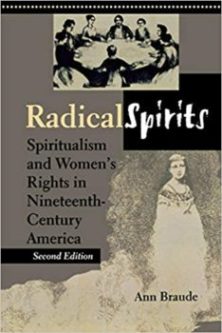Book Review: Radical Spirits by Anne Braude

Ann Braude. Radical Spirits: Spiritualism and Women’s Rights in Nineteenth-Century America. Bloomington: Indiana University Press, 1989, 2001.
Anne Braude’s 1989 Religious Studies classic Radical Spirits was one of the first texts to discuss how religion empowered women politically through the late nineteenth-century phenomenon of Spiritualism, a belief system that spoke to multitudes. Spiritualism involved the communication of the dead through spirit mediums who were often female. The movement was attractive not simply because it allowed followers to process frequent grief of the period, but because it allowed women a public voice and authority (through the spirit) usually denied them, and was viewed as a scientific practice which offered empirical proof of an afterlife. Omnipresent death need not be feared. Believers held both science and religion in tandem, as both Howe and Reynolds have discussed.
It was the weakness and piety of women, the very qualities that usually forbid their public speech, that allegedly attracted spirits to them. As with earlier evangelical revivals, divine wisdom was available directly to people, which allowed them both a growing individualism and political voice. Spiritualism was not a fringe belief but involved hundreds of thousands. It cut across various denominations and itself grew out of radical Quakerism, Unitarianism, Universalism, Swedenborgianism, transcendentalism, and the work of Andrew Jackson Davis. Spiritualism allowed a shift from the harshness of Calvinist predestination and orthodoxy to one of direct experience with deceased spirits and experienced knowledge of the immortality of the soul.
The experience of speaking publicly as mediums in various halls and events led women to greater self-confidence and autonomy as well as earn a decent living. The entire movement was individualistic but community-minded, anti-authoritarian, and anti-establishment. The women came to believe that a just society meant that women must be more equal to men. While Spiritualism intersected with various reform movements such as health and diet reform, dress reform, hydropathy (which Cayleff touches on briefly), abolition, marriage reform, suffrage, free love, mesmerism (see Fuller and Ogden), labor reform, children’s rights, socialism, and anarchism. Most central to this study are those that concern women’s rights. As with Cayleff, the personal project is intimately connected to social reform. Spiritualism’s engagement with health reform, to which a chapter is dedicated, also featured similar opposition to allopathic male authorities, as in Cayleff’s treatment of the water cure.
By the Civil War era, Spiritualism (like hydropathy) began to decline. Reform movements lost their individualistic and antiauthoritarian zeal and reached out to orthodox institutions like the government, which frowned on radical beliefs. Spiritualism’s role in women’s rights movements declined as claims of fraudulence abounded and free love scandals lessened its popularity. Major women’s rights activists, who tended to be upper class and classist, had never been a part of the popular movement and rejected it outright. Likewise, as mediums became suffragists they lost interest in the dead. When a national association was created in 1865, as with many advances for women in new religious movements, women were pushed aside when the movements grew larger and institutionalized (see also Brekus, Strangers and Pilgrims). In the 1870s, Theosophy and Christian Science, belief systems that had similar roots and beliefs as Spiritualism but were markedly more socially conservative, overtook it in popularity.
CATEGORIES: Women’s History 19th Century U.S., Religious Studies, 19th-Century Social Change, Spirituality, Women & Politics, Religion, Politics and Women, Spiritualism, Mediums
PLACE: United States
TIME PERIOD: 1848-1890
Was this useful? Keep us going with a quick tip. Thank you!
And buy stuff that you need from the links. Some of them send us kickbacks at no cost to you, but a wee cost to the empire. Thank you! ♥